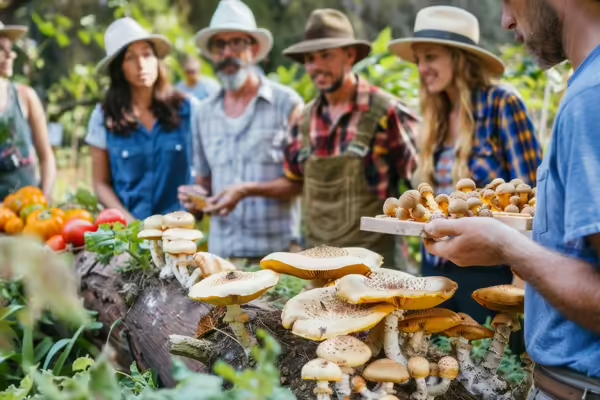
Did you know that the shiitake mushroom is the second most popular mushroom in the world?
In fact, shiitake mushroom production accounts for more than 25% of total global mushroom production annually. Although it is native to East Asian countries like China and Japan, they can also be produced right here in Illinois on hardwood logs. That’s great news for those who may want to try an annual spring and fall delicacy—log-grown shiitake mushrooms.
If you're interested in learning how to grow these valuable delicacies—whether as a small farmer or a home growing hobbyist—you're in luck! A shiitake log inoculation workshop is coming up in less than a month, just a 30-minute drive from Bloomington-Normal.
Upcoming workshop
A Shiitake Mushroom Log Inoculation Workshop will take place on Thursday, May 8th from 5:30 to 7:30 PM at 19-By-1950 Family Farm, located at 1911 County Road 1950 N, Benson, IL. This workshop offers small farmers and members of the public an opportunity to learn about this time-tested method for cultivating shiitake mushrooms and exploring a new, income-generating crop. It's a simple and sustainable practice that can thrive alongside other farm or garden enterprises and projects.
In this workshop, we will cover hardwood log sourcing, the necessary tools, and post-inoculation care. Participants will receive resources for shiitake log production. The workshop will feature a demonstration of the inoculation process, during which participants will help inoculate many logs. The program will conclude with a Q&A session. Each participant will also take home their own log to test in their production space at their farm or home.
The method is straightforward, but it is a bit labor-intensive. However, many would argue it is worth the effort.
Inoculation process
Fresh, high-quality logs from specific tree species, such as white oak and sugar maple, are sourced locally or regionally and then transported to the site where they will be inoculated. The logs should not exceed 3 feet in length or 8 inches in diameter. It is important to inoculate the logs close to where they will remain for their 3 to 5 years of production to simplify logistics.
Logs are placed on an elevated surface such as a sawhorse, workbench, or picnic table. Using specially designed power tools, holes are drilled in a diamond pattern across the log's surface. These holes are then filled with specialty, lab-grown mushroom “spawn” — either plug spawn or sawdust spawn — both of which can be purchased online from various mushroom cultivation supply companies. After filling the holes with the spawn, they are sealed with food-grade wax.
Log aftercare
After drilling holes into the logs, they are filled with mushroom spawn, and the holes are sealed with food-grade wax. The logs are then placed in the log laying yard, which is a specially designated shady and humid area of the farm or garden. This location is chosen to protect the logs from wind and direct sunlight for as much of the day as possible.
What’s happening to them now? The mushroom mycelium in the spawn starts to colonize the logs from the inside out over a period of 6 to 12 months.
To optimize mycelial growth, logs should be placed on a surface elevated off the ground. A pallet is an excellent option for this. The log-laying area should be as humid and shaded as possible for the best results. It is important to keep the logs moist during the hottest and driest periods of the year, particularly during drought conditions.
Harvest
After 6 to 12 months, log faces should begin to turn white with mycelium growth, which is a positive sign. Begin monitoring logs closely after the 6-month mark, when moisture and temperature levels fluctuate drastically.
Logs can be allowed to fruit naturally, which typically occurs in the spring and fall over several years. Alternatively, logs can be completely submerged in water for several hours to stimulate growth, resulting in fruiting within a few days, following a regular schedule. When force-fruited under ideal conditions, shiitake logs can yield approximately ½ pound of mushrooms during each fruiting cycle.
Join us for the workshop in Benson to learn more! Visit go.Illinois.edu/lmw/events to register for the program. There is a cost of $10.
University of Illinois Extension develops educational programs, extends knowledge, and builds partnerships to support people, communities, and their environments as part of the state's land-grant institution. Extension serves as the leading public outreach effort for University of Illinois Urbana-Champaign and the College of Agricultural, Consumer and Environmental Sciences in all 102 Illinois counties through a network of 27 multi-county units and over 700 staff statewide. Extension’s mission is responsive to eight strategic priorities — community, economy, environment, food and agriculture, health, partnerships, technology and discovery, and workforce excellence — that are served through six program areas — 4-H youth development, agriculture and agribusiness, community and economic development, family and consumer science, integrated health disparities, and natural resources, environment, and energy.